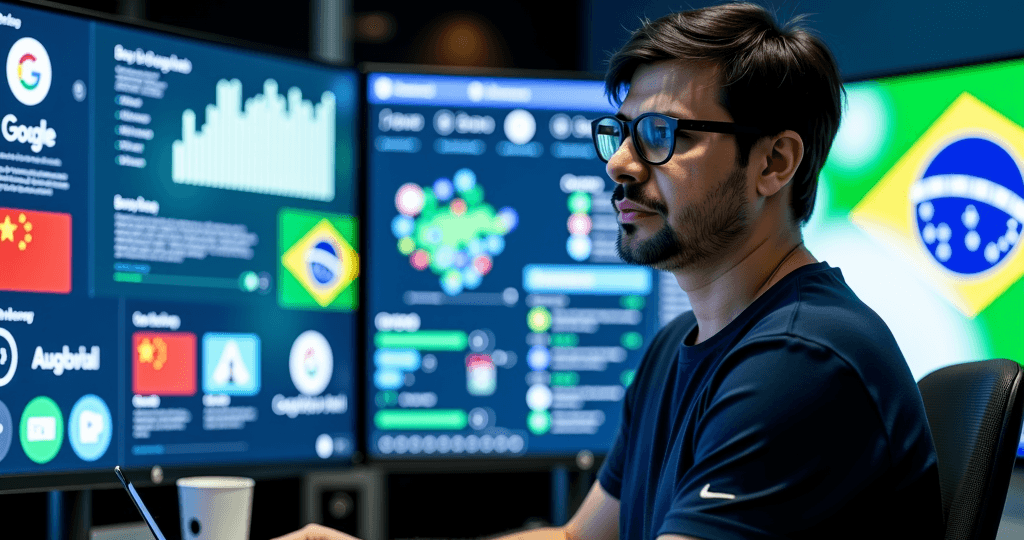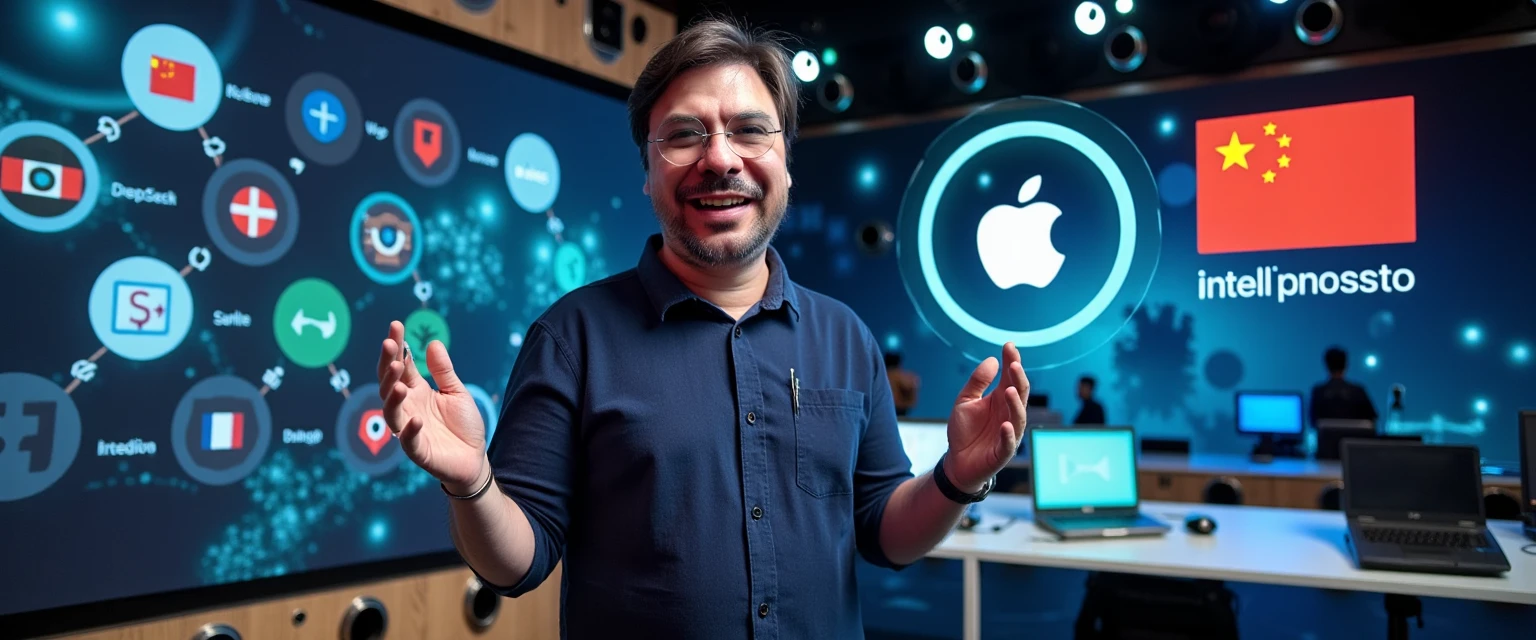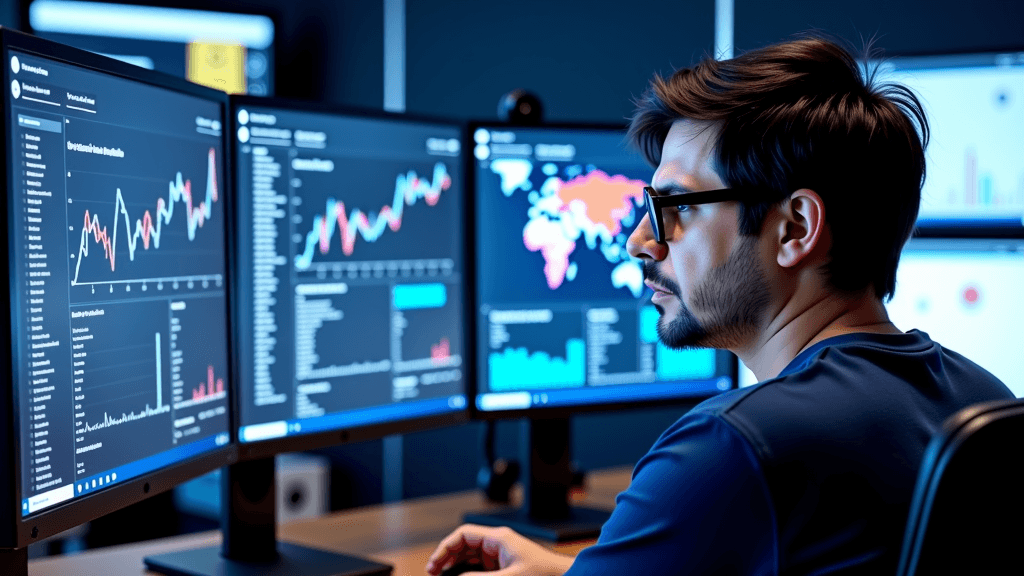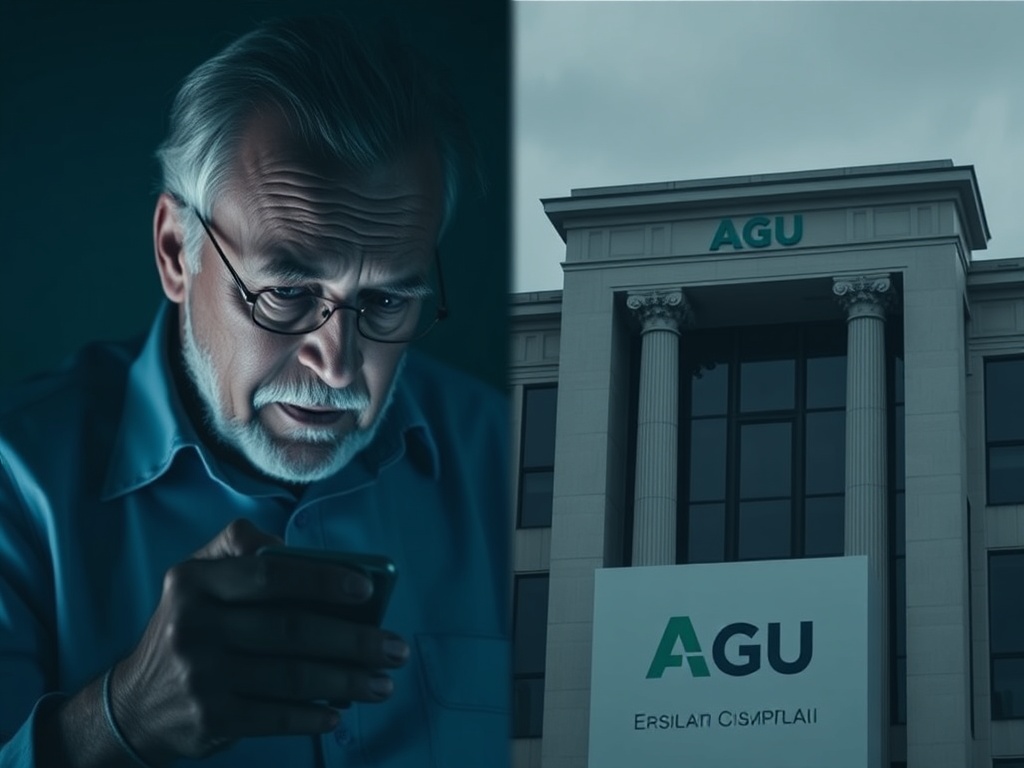AI Radar: Brazilian Researcher Blocked, China's Advances and the Environmental Paradox
March 22, 2025 | by Matos AI

Geopolitical Tensions and Barriers for Brazilian AI Talent
The geopolitics of artificial intelligence continues to show its harshest side, and this time, a Brazilian is at the center of the issue. Rodrigo Nogueira, one of Brazil's leading AI researchers, was denied a visa to enter the United States, where he was scheduled to give a lecture at Harvard University. The case is emblematic and worrying.
Second report from Estadão, Nogueira noticed a clear change in the attitude of the interviewers at the American consulate when he mentioned that he worked with artificial intelligence. The consulate requested additional documents about his trip to Taiwan and his research at New York University, culminating in the denial of the visa.
This incident is not isolated. It reflects a growing tension in the global AI landscape, where knowledge of advanced technologies is becoming a matter of national security. The US response appears to be part of a broader strategy of technological containment aimed primarily at China.
Join my WhatsApp groups! Daily updates with the most relevant news in the AI world and a vibrant community!
- AI for Business: focused on business and strategy.
- AI Builders: with a more technical and hands-on approach.
On another front of this same battle, Poder360 reports that the US has detained Chinese startup DeepSeek on charges of posing a threat. The pattern is clear: we are facing a true technological arms race, where AI knowledge has become a currency of high strategic value.
China Pushes Forward with Government-Backed AI Startups
Meanwhile, China is pursuing its own strategy to dominate the AI landscape. Folha de S.Paulo reports that Beijing is boosting the startup Manus, which recently announced its AI assistant with ambitions to compete with established models.
The government’s support for Manus signals China’s approach to AI development: a coordinated effort between the state and the private sector. It is fascinating to see how, even with strict regulations on AI use, the Chinese government finds ways to foster innovation in strategic areas.
This dynamic reinforces something I have been defending for years in my mentoring sessions and lectures: the crucial importance of well-structured public policies for technological development. In Brazil, we have had some initiatives in this sense, such as the Start-Up Brasil program that I had the honor of directing, but we need to advance much further if we want to have global relevance.
The Evolution of AI: From Processing to “Thinking”
One of the most interesting developments in the last 24 hours comes from UOL Tilt report about what they call a “thinking robot.” We are witnessing a paradigm shift in the way AIs work, with a greater emphasis on reasoning rather than simply responding to prompts.
OpenAI has apparently introduced a significant shift in this direction, and several models with this new ability are quickly emerging among competitors. It’s an expected development, but no less impressive.
However, we need to look at these statements with caution. The test “Humanity's Last Exam”, mentioned by GZH, has been measuring the performance of AIs in several areas and revealing a more nuanced picture. Despite the improvement in reasoning capabilities, the performance of these AIs is still inferior to human experts in many areas.
This reinforces one of my main messages when I talk about AI in my corporate trainings: we need a realistic view of the capabilities and limitations of these technologies, avoiding both excessive hype and paralyzing skepticism.
AI and Education: CAPES Invests in Pedagogical Innovation
One piece of news that makes me particularly optimistic comes from the education sector. CAPES announced which will select up to 30 proposals that use AI in education with a focus on pedagogical innovation. The selected projects will receive funding for implementation, with the aim of improving the quality of education in Brazil.
This initiative speaks directly to my experience as the founder of the first neo-university in Latin America. At Sirius, we have always worked with the perspective that technology should be an ally in the transformation of education, not just an accessory.
The application of AI in educational contexts is a promising field that can help overcome some of the historical bottlenecks in Brazilian education. However, we need to ensure that these technologies are implemented in an inclusive and ethical manner, avoiding deepening existing inequalities.
Consumption and Service: AI Creating More Fluid Experiences
In the customer service sector, AI is also causing significant transformations. According to Terra, artificial intelligence is transforming customer service with faster and more accurate interactions. AI’s ability to understand interactions and generate insights is becoming essential, especially with advances in generative AI.
I’ve seen this movement closely in my work with startups and established companies. Those that can successfully implement AI-specific solutions, integrating advanced knowledge management systems, are creating significant competitive advantages.
The central question for entrepreneurs and managers is: how can we implement these technologies efficiently and safely? In my mentoring programs, I emphasize that it is not enough to simply adopt technology – it is necessary to redesign processes and, above all, prepare people to work together with these tools.
The Environmental Paradox of AI
One dimension often overlooked in the enthusiasm for AI advances is their environmental impacts. Experts warn, according to the National Radio Agency, that the use of AI generates considerable environmental impacts, with electricity demand potentially doubling by 2026.
This is an interesting paradox: on the one hand, AI can help optimize systems, reducing waste and increasing energy efficiency; on the other hand, AI systems themselves are energy intensive. Large language models (LLMs) like GPT-4 or Claude consume enormous amounts of energy both in their training and in their operation.
Brazil has a privileged position in this debate, thanks to our predominantly renewable energy matrix. We can and should take advantage of this competitive advantage to develop more sustainable AI solutions, positioning ourselves as leaders in green technologies.
AI and Media: Fully Automated Journalism
In the media field, one piece of news draws attention: Italian newspaper Il Foglio has launched an edition made entirely by AI, according to Folha de S.Paulo. This initiative raises important questions about the future of journalism and the role of human supervision in content production.
Throughout my professional career, I have always argued that technology should amplify human capabilities, not replace them completely. In the case of journalism, there are elements such as cultural context, ethical sensitivity and editorial discernment that require a deeply human understanding.
At the same time, we cannot ignore the potential of AI to automate repetitive tasks and free up journalists for higher-value work, such as in-depth investigations and complex analysis. The challenge lies in finding the right balance.
Perspectives for Entrepreneurs and Innovators
Looking at the news landscape of the past 24 hours, it is clear that we are at a turning point in the evolution of AI. Geopolitical tensions, technical advances, applications in various sectors, and ethical and environmental concerns create a complex scenario, but one full of opportunities.
For Brazilian entrepreneurs, I recommend paying special attention to three points:
- Development of technological sovereignty: The case of the Brazilian researcher barred from the US demonstrates the importance of building our own infrastructure and knowledge in AI, as Nogueira pointed out in his interview.
- Focus on specific solutions to local problems: Instead of trying to compete head-on with global giants, identify Brazilian or Latin American problems that can be solved with AI.
- Attention to environmental and social impacts: Develop from the beginning a responsible vision of how your technology impacts the world, considering environmental, ethical and social aspects.
Over my 25 years of experience in technology and innovation, I have learned that moments of transformation like these are the most fertile for visionary entrepreneurs. In my mentoring and advisory work for startups, I have helped founders navigate this complex scenario, identifying concrete opportunities amidst uncertainty.
Conclusion: Brazil at the AI Crossroads
The news of the last 24 hours shows that we are at a global crossroads in the development of AI. Geopolitical disputes are intensifying, technologies are advancing rapidly, and the social, economic and environmental impacts are becoming increasingly evident.
Brazil needs to define its role in this scenario. We have world-class talent (as demonstrated by Rodrigo Nogueira’s own story), a privileged energy matrix to support green technological development, and social challenges that can benefit enormously from intelligent AI applications.
In my work with companies, startups and entrepreneurship support institutions, I have emphasized the need for a strategic approach that combines long-term vision with pragmatic execution. We cannot afford to remain on the sidelines of this technological revolution.
If you are developing AI-based solutions or looking to apply these technologies in your organization, I am available to share insights and experiences accumulated over the years helping more than 10,000 startups. The future of AI in Brazil is being written now, and each of us has a role to play in this story.
✨Did you like it? You can sign up to receive 10K Digital's newsletters in your email, curated by me, with the best content about AI and business.
➡️ Join the 10K Community here
RELATED POSTS
View all



